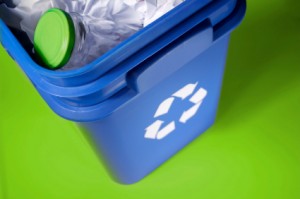 Most people don’t realize that solid waste reduction and recycling help address climate change.
Most people don’t realize that solid waste reduction and recycling help address climate change.
How? Manufacturing, transporting and using the product – as well as management of the resulting waste – all result in greenhouse gas emissions.
Waste prevention and recycling reduce methane emissions, save energy, and increase forest carbon sequestration.
Recycling
Putting materials aside for recycling helps in many ways: we send less garbage to the landfill, and we save valuable materials and energy producing new products – for example, plastic bottles can be converted into fleeces and garden furniture. Did you know that recycling aluminum cans saves 95% of the energy used in making a new can? (1) New technologies are furthering our ability to recycle “waste” into resources that we need.
Manitobans use almost 3,000 tonnes of PET plastic containers every year. (2)
- Winnipeg – For more information on the City of Winnipeg’s Recycling program visit City of Winnipeg Water & Waste.
- Brandon – For more information on the City of Brandon’s Recycling program visit City of Brandon – Recycling and Composting Information.
Composting
If organic waste decomposes without oxygen it will produce methane – a powerful greenhouse gas that has 25 times the global warming potential of carbon dioxide (CO2).
Composting allows organic waste to decompose in the presence of oxygen through the action of bacteria and other microorganisms. This releases CO2 but prevents methane production.
Which means, the fruit, yard, and vegetable waste you usually throw out can be placed in a bin and eventually will decay and degrade into humus (or compost). Humus can be used to enrich the soil on your lawn and garden.
By composting, you can reduce your household waste by as much as 40%. (3) All you need to do is separate the organic matter (fruit, yard, and vegetable waste) from your waste, place it into a compost bin, mix, and eventually you will have compost.
For more information about composting at home visit Green Action Centre. They even provide workshops.
E-waste
Electronic waste or “e-waste” is any discarded electrical or electronic appliance.
Most e-waste contains metals and chemical compounds that are toxic and are not biodegradable. e-Waste must never be discarded with your regular trash. It needs to be taken to special depots where it can be dealt with properly.
For a list of e-waste depots and times in Manitoba, visit the province’s Waste Wise.
Also, some retailers will accept some types of e-waste. For example
- IKEA will take lightbulbs and batteries
- Mountain Equipment Coop will take cell phones and rechargeable batteries
- RONA will take Compact Fluorescent Lightbulbs (CFL)
- Hewlett Packard will recycle computer equipment or HP printing supplies.
Purchasing
Waste reduction starts when you are shopping. When you go shopping follow these guidelines:
- Buy durable products instead of those that are disposable or cheaply made.
- Repair/restore used items before replacing them.
- Buy items you can re-use. Re-using margarine tubs to freeze foods or pack lunches, for instance, reduces the need for foil or plastic wrap.
- Buy items you can recycle locally through curbside collection or recycling centers.
- Avoid excess packaging when choosing product brands. Buy products in bulk.
- Buy just the amount you need: larger sizes reduce the amount of packaging, but smaller quantities reduce leftover waste.
Reusing
Computers, furniture, clothing – so many items can be reused. Repurposing plastic and glass containers, repairing broken appliances and shoes or finding a charity that will make use of them – we help ourselves and others, and delay the point at which materials become waste.
Save paper
Paper and paper products account for more than one third of the materials discarded into Canada’s municipal waste stream. Here are some tips to reduce the consumption of paper products:
- Print and photocopy on both sides
- Save one-sided paper for draft printing and notes
- Eliminate unnecessary reports and reduce report size
- Don’t use cover sheets for faxes
- Make fewer copies
- Proof and preview documents on screen prior to printing
- Reuse envelopes by placing a label over the old address
- Reuse file folders
- Buy recycled paper for printers, copiers, and fax machines
Plastic bags
An estimated 500 billion to 1 trillion plastic bags are consumed worldwide each year. (4) That comes out to over one million per minute. The worst of this is billions of these bags end up as litter each year.
There is an easy solution to this – BYOB (Bring Your Own Bag). Next time you go shopping just grab a couple bags and maybe a bin or box. Many stores now sell bags that can be used for multiple uses.
Here are some of the environmental impacts from plastic bags:
- The key ingredients in plastic bags are petroleum and natural gas. The manufacturing of plastic bags accounts for 4% of the world’s total oil production. (5)
- The energy used to make a typical plastic bag is 0.48MJ or manufacturing 8.7 plastic bags is equivalent to driving a car 1 km. (6)
- Hundreds of thousands of sea turtles, whales and other marine mammals die every year from eating discarded plastic bags mistaken for food. (7)
- Plastic bags don’t biodegrade, they photodegrade—breaking down into smaller and smaller toxic bits contaminating soil and waterways and entering the food web when animals accidentally ingest.
- According to David Barnes, a marine scientist with the British Antarctic Survey, plastic bags have gone “from being rare in the late 80s and early 90s to being almost everywhere from Spitsbergen 78° North [latitude] to Falklands 51° South [latitude].
- Plastic bags are among the 12 items of debris most often found in coastal cleanups, according to the nonprofit Center for Marine Conservation.
- Plastic shopping bags have been blamed for flooding in Mumbai and Bangladesh causing over a 1,000 deaths – the bags clogged the gutters and drains preventing water from leaving the cities. (8)




